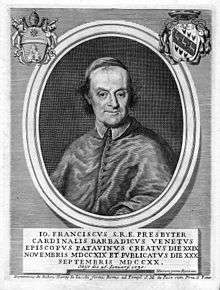Giovanni Francesco Barbarigo
Giovanni Francesco Barbarigo (29 April 1658 at Venice – 1730) was an Italian cardinal and nephew of Saint Gregorio Barbarigo (1625–97).

Born to a noble family of Venice on 29 April 1658, Giovanni Francesco Barbarigo was the nephew of Cardinal Gregorio Barbarigo. Giovanni Francesco first entered the diplomatic service and was twice sent as representative of the Venetian Republic to the court of King Louis XIV of France. However, he soon turned to an ecclesiastical career, where, if not the great ardor of his vocation, at least illustrious family traditions called him.[1]
In 1674 he became Primicerius of the Church of St. Mark at Venice, and the same year, was named by Pope Innocent XII Bishop of Verona. Faced with the difficulties and practical problems of his daily apostolic work, he always returned to the great model that could not help but occupy his mind, that of his great uncle Gregory Barbarigo, who in turn, had taken Charles Borromeo as his model. Thus, in his religious action and in his ecclesiastical activity, the methods and themes that dominated the Venetian Church in its counter-reformation action are seen again. He greatly increased the number of clerics; paying particular attention to the seminaries of the diocese.[1]
Prayer, preaching, personal witness of faith, as practical ideals of action of the Counter-Reformation, he was able to translate and apply with commitment and dedication to his Episcopal See. He personally visited hospitals and provided relief in the most diverse situations, such as during an epidemic that struck his diocese in 1702. He provided for the rest of the territories entrusted many missions, which he assigned entirely to the fathers of the Society of Jesus. On every occasion he became a strong supporter of the rights and prerogatives of the Church with regard to power and civil order, defending ecclesiastical immunities with particular attention.[1]
He was transferred to Brescia in 1714, created cardinal in 1720, and in 1723 became a successor of his uncle in the See of Padua.[2] He was zealous in promoting the cause of beatification of Gregorio Barbarigo, and lent his encouragement to the production of literary works. To his suggestion was due the inception of the ecclesiastical history of Verona, and the works of St. Zeno, Bishop of Verona (362-380), were reprinted at his expense in Padua, in 1710.[3]
Giovanni Francesco Barbarigo died in 1730.[3]
References
- Barbarigo, Giovanni Francesco", Treccani
- Phillips, Lawrence Barnett. The Dictionary of Biographical Reference, S. Low, Son, & Marston, 1871, p. 96
- Weber, N. (1907). Giovanni Francesco Barbarigo. Catholic Encyclopedia New York: Robert Appleton Company. Retrieved July 23, 2019 from New Advent.

![]()
External links and additional sources
- Cheney, David M. "Diocese of Padova {Padua}". Catholic-Hierarchy.org. Retrieved June 16, 2018. (for Chronology of Bishops) [self-published]
- Chow, Gabriel. "Diocese of Padova (Italy)". GCatholic.org. Retrieved June 16, 2018. (for Chronology of Bishops) [self-published]
| Catholic Church titles | ||
|---|---|---|
| Preceded by Pietro Leoni (bishop) |
Bishop of Verona 1698–1714 |
Succeeded by Marco Gradenigo |
| Preceded by Gianalberto Badoer |
Bishop of Brescia 1714–1723 |
Succeeded by Fortunato Morosini |
| Preceded by Francesco Pignatelli |
Cardinal-Priest of Santi Marcellino e Pietro 1721–1730 |
Succeeded by Sigismund Kollonitsch |
| Preceded by Giorgio Cornaro (cardinal) |
Bishop of Padua 1723–1730 |
Succeeded by Giovanni Minotto Ottoboni |